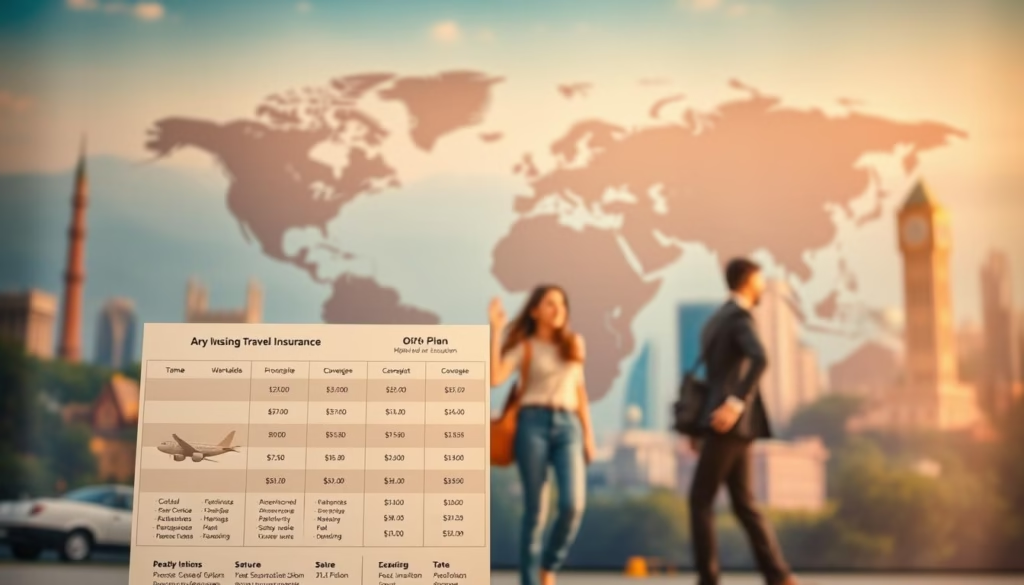Wonder what can protect a high-value trip to a remote East Africa country from costly surprises? That question matters when average itineraries exceed five figures and medical access can mean long transfers.
U.S. visitors benefit from clear, comprehensive travel insurance because the country’s tourism board strongly urges medical coverage and many excursions are remote. Premiums often equal a small slice of total trip cost but can save thousands if you must cancel or evacuate.
Good policies commonly include trip cancellation and interruption, emergency medical and evacuation, baggage protection, and 24/7 assistance. Industry guidance recommends at least $100,000 for emergency medical and $250,000 for medical evacuation; average premiums hover near $1,048.20.
Whether you hold gorilla permits, plan multi-park safaris, or carry costly gear, compare limits, covered reasons, exclusions, and assistance networks to match your itinerary. This page helps you weigh options, align plans with budget and risk tolerance, and get quotes fast.
Key Takeaways
- Trusted Rwanda travel insurance for U.S. travelers: compare coverage and secure your trip today
- travel insurance rwanda: what’s covered for your trip
- Plans, quotes, and costs: how U.S. travelers can compare and buy Rwanda coverage online
- Conclusion: protect your Rwanda adventure with the right coverage and buy online with confidence
- FAQ
- High average trip value makes modest premiums a smart safeguard.
- Recommended minimum limits: $100,000 medical, $250,000 evacuation.
- Look for trip cancellation, emergency evacuation, baggage, and 24/7 help.
- Compare limits, exclusions, and assistance networks before buying.
- Ideal for gorilla permit holders, multi-park safari-goers, and multi-leg itineraries.
Trusted Rwanda travel insurance for U.S. travelers: compare coverage and secure your trip today
When your itinerary includes primate treks and multi-leg flights, solid coverage becomes more than a convenience. U.S. visitors often book high-value packages and visit remote parks, so medical and evacuation limits matter.

Why travel insurance is strongly recommended for visiting now
Remote destinations and costly permits increase financial risk. Local authorities strongly encourage medical coverage, and long connections to Kigali add missed-connection exposure.
Who benefits most
- Safari-goers moving between parks with private transfers.
- Gorilla trekkers holding expensive permits and gear.
- Multi-leg visitors whose itineraries create extra points of failure en route to Kigali International Airport.
24/7 assistance can coordinate care, transport, and translation—critical when you are far from familiar services.
| Traveler Type | Key Risk | Recommended Focus |
|---|---|---|
| Safari-goers | Park transfers, vehicle incidents | Evacuation & baggage coverage |
| Gorilla trekkers | Injury on trek, permit loss | Medical limits & cancellation |
| Multi-leg visitors | Missed connections, delays | Delay & missed-connection protection |
Compare policies early—after initial payments—to preserve pre-departure protections and align limits with your medical needs and adventure elements.
travel insurance rwanda: what’s covered for your trip
Picking proper limits for emergency care and evacuation prevents costly surprises on remote routes.

Emergency medical coverage
Recommended: $100,000 for medical medical insurance emergency care. Typical eligible expenses include hospital stays, physician services, ambulance, diagnostics, and prescriptions during a covered emergency.
Emergency medical evacuation
Aim for at least $250,000 to cover ground or air evacuation from Volcanoes, Nyungwe, or Akagera to the nearest adequate facility, plus onward transport if needed.
Trip cancellation, interruption, and delay
Trip cancellation can reimburse up to 100% of prepaid, nonrefundable expenses for covered reasons. Trip interruption covers unused trip portions and added transport costs to return home.
Delay and missed-connection benefits kick in after a minimum delay threshold and pay per-day and overall limits to cover lodging, meals, and rebooking costs.
Baggage and adventure considerations
Baggage delay pays for essentials when bags are late. Baggage loss covers stolen, lost, or damaged gear—critical for cameras and trekking equipment.
Adventure-ready policies should confirm coverage for gorilla trekking and primate safaris and note any required riders or activity exclusions.
Liability, assistance, and exclusions
24/7 assistance arranges care, payment guarantees, and evacuation coordination across East Africa. Review conditions such as pre-existing condition look-back periods, hazardous activity exclusions, and documentation rules before you buy.
| Benefit | Recommended Limit | Notes |
|---|---|---|
| Emergency medical | $100,000 | Hospital, physician, ambulance, diagnostics, prescriptions |
| Medical evacuation | $250,000+ | Air/ground transport from remote parks to adequate care |
| Trip cancellation / interruption | 100% of prepaid expenses | Covered reasons: illness, weather, terrorism, etc. |
| Baggage delay / loss | Per policy limits | Essentials reimbursement and compensation for lost gear |
Plans, quotes, and costs: how U.S. travelers can compare and buy Rwanda coverage online
Start by benchmarking premiums against your total trip value to set realistic expectations.
Cost benchmark: Many U.S. visitors pay about 5% of trip value for adequate protection. For high-cost itineraries this aligns with observed averages and helps you gauge a reasonable premium versus out-of-pocket expenses.

Picking the right plan
Comprehensive plans include cancellation, interruption, medical, evacuation, delay, and baggage protections. Travel medical insurance focuses on medical and evacuation only. Choose comprehensive when you prepay significant tour or permit fees.
Where to buy
Use online comparison tools to compare policies side by side and compare plans and get quotes. Airline add-ons can be convenient but may offer limited options; note some carrier offers are restricted by residency.
Practical tips
- Match medical and evacuation limits to remote park risk and itinerary complexity.
- For multi-leg flights, confirm delay and missed-connection definitions and limits.
- Document baggage loss/delay with receipts and airline property irregularity reports to speed claims.
Claims tip: Keep receipts, file promptly, and contact 24/7 assistance to open a case number and arrange emergency help.
Conclusion: protect your Rwanda adventure with the right coverage and buy online with confidence
strong, A few deliberate choices in policy limits can save thousands if an emergency occurs far from care.
Summary: Combine recommended emergency medical and medical evacuation limits with trip cancellation protection to shield high-value itineraries. Add delay, interruption, and baggage loss safeguards for multi-leg routes and gear-heavy plans.
Compare plans online early, check activity riders for gorilla trekking and safaris, and confirm definitions for covered reasons and pre-existing condition language. Set limits that match your route and parks, verify sub-limits for cameras and optics, and keep policy documents and 24/7 services contacts handy.
With tailored rwanda travel insurance and thoughtful choices, U.S. travelers can protect expenses and enjoy the trip with confidence.
FAQ
What limits should I look for in emergency medical coverage when visiting Kigali?
Aim for at least 0,000 in emergency medical benefits. That level helps cover hospital stays, urgent care, and specialist fees if you fall ill or get injured while on safari or in city activities. Verify deductible amounts and whether pre-existing conditions are covered before you buy.
How much emergency medical evacuation coverage is recommended for remote areas and gorilla trekking?
For remote rescues and air ambulance services from parks and lodges, plan for a minimum of 0,000. Evacuation costs from wilderness sites can be high, so choose a policy that includes air evacuation and transport to the nearest appropriate medical facility.
Will cancellation or interruption benefits reimburse added transport or accommodation costs?
Yes, comprehensive plans typically reimburse nonrefundable trip costs and reasonable extra expenses if you must cancel or cut short for covered reasons like illness, jury duty, or a natural disaster. Check policy wordings for covered reasons and caps on reimbursements.
Does coverage include delays and missed connections for multi-leg itineraries to East Africa?
Many plans offer protection for delays, missed connections, and related expenses such as meals and lodging. Confirm minimum delay time requirements and limits per incident to ensure coverage aligns with long-haul flight schedules and regional transfers.
Is baggage loss, theft, or delay covered while moving between airports and lodges?
Most policies provide reimbursement for lost, stolen, or delayed baggage, with specific limits per item and overall caps. For high-value camera or binocular gear used on safaris, consider adding a scheduled personal effects rider for full protection.
Are adventure activities like gorilla trekking covered automatically?
Some standard plans include low-risk hiking, but specialized activities often require an adventure or expedition endorsement. Look for policies that expressly cover trekking, guided primate safaris, and related guided excursions to avoid gaps in protection.
Do policies offer personal liability and 24/7 emergency assistance while in-country?
Yes, many policies bundle personal liability and global assistance services. These resources help with legal referrals, emergency cash transfers, and locating medical providers. Confirm the scope and whether assistance is reachable by phone from your destination.
What common exclusions should I review before purchasing a plan?
Read exclusions for pre-existing medical conditions, extreme sports, unapproved travel advisories, and incidents under the influence of alcohol or drugs. Also check cancellation reasons not covered, such as routine work obligations or forgotten documents.
How much does a typical policy cost for U.S. residents planning a visit?
A guideline is about 5% of the total trip cost for comprehensive plans, though medical-only policies can be lower. Price varies with traveler age, trip length, coverage limits, and add-ons like evacuation or cancel-for-any-reason options.
Should I choose a comprehensive plan or travel medical coverage only?
If you prepay tours, lodges, and international flights, a comprehensive plan offers protection for cancellations, interruptions, and baggage. If you just need health protection while abroad, a travel medical policy focused on emergency care and evacuation may suffice.
Where is the best place to buy and compare policies for an East Africa itinerary?
Use reputable online comparison sites, insurer direct portals, or licensed travel agents to compare benefits, limits, and customer reviews. Avoid airline add-ons without checking alternative coverage; they can be convenient but more limited.
How do I choose the right coverage limits for different traveler profiles?
Base limits on age, health, trip cost, and planned activities. Families with expensive prepayments need stronger cancel/interruption limits. Older travelers or those with medical histories should lean toward higher medical and evacuation caps.
Does routing and multi-leg travel affect coverage for missed connections to Kigali International Airport?
Yes. Policies usually require you to use scheduled carriers and follow ticketed itineraries. Excessive stopovers or separate tickets can complicate claims. Verify connection protection and whether coverage applies to independent segments.
What documentation do I need to file a claim for emergencies or baggage loss?
Keep medical reports, police reports, original receipts, proof of travel bookings, and airline property irregularity reports for baggage claims. Submit detailed documentation promptly and follow the insurer’s claim procedures to avoid delays.
How quickly can I get help if an emergency happens abroad?
Most plans include 24/7 global assistance hotlines that coordinate medical evacuations, hospital referrals, and billing support. Save contact numbers and policy ID on your phone and print a copy to carry with travel documents.